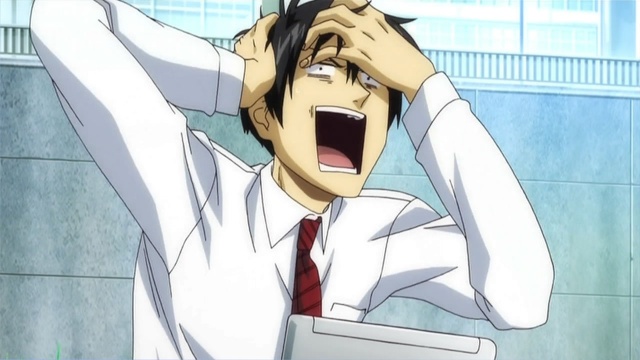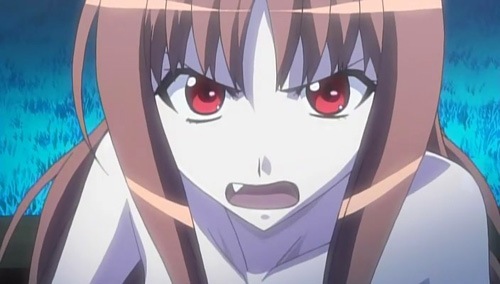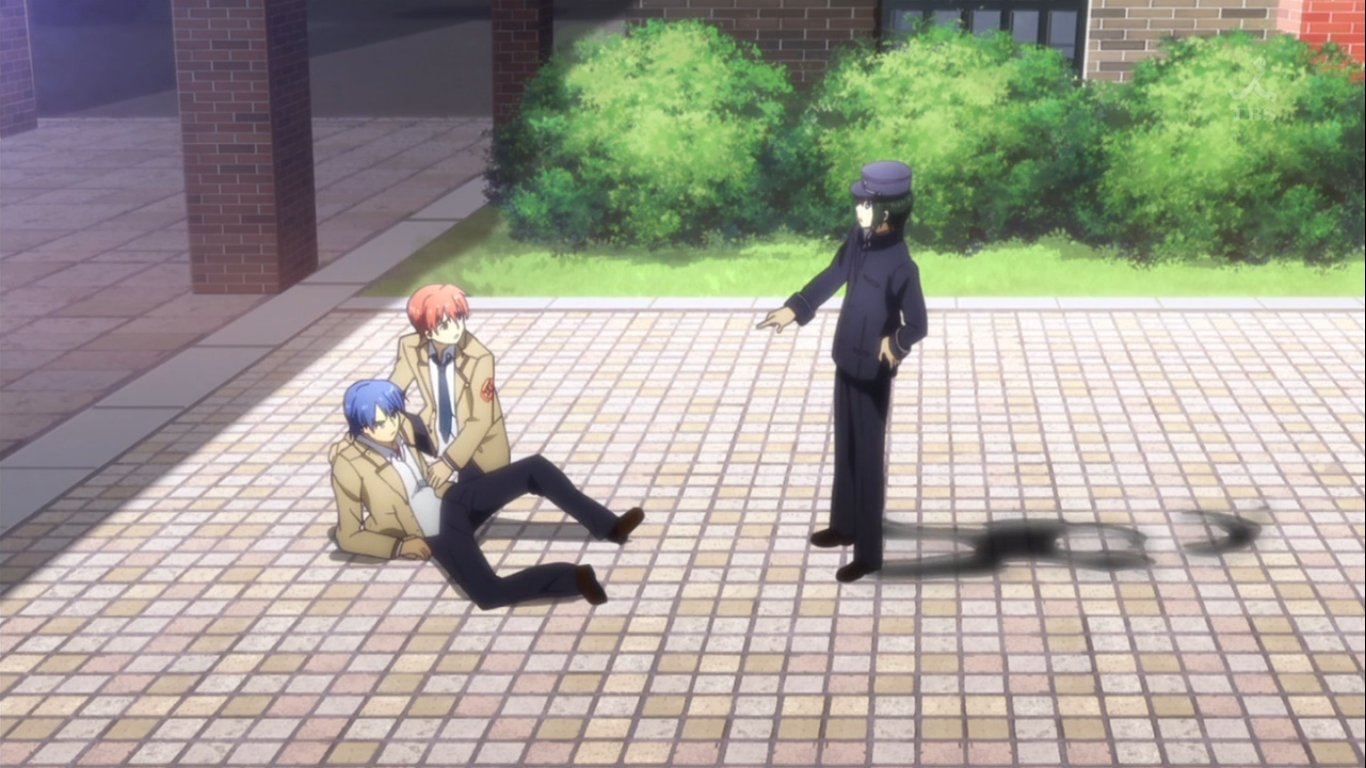
i feel something so soft on my head...<
Arakawa Under the Bridge is a crazy gag comedy directed by Shaft. It depicts how a young and successful prodigy, Ichinomiya Kou, ends up living with a bunch of homeless and, frankly, crazy people under the bridge. The jokes in the show are indeed hilarious and it’s unlikely you’ll end up laughing not once or twice. However, at the same time, this anime never really attempts at doing anything else with its characters other and gags, and despite introducing a serious side never really attempts to finish it. So, it kind of depends on what you want, if you are perfectly okay with a barely advancing story and a lot of crazy gags, then, yeah, definitely check Arakawa out. If you are looking for a solid story - look elsewhere.

hiks..hiks.. i had been rejected
Originally drawn as manga by
Nakamura Hikaru and later adapted to anime form by
Shinbou Akiyuki (
Bakemonogatari)
Arakawa Under the Bridge is a gag anime picturing Ichinomiya Kou, a young prodigy as well as a director of one of the most wealthy companies in the world, attempting to start a new life under a bridge together with a bunch of really eccentric (on a mental level) people. As far as I could tell the show doesn’t have a consecutive storyline and though there are a few attempts to make the series more serious they are rendered completely futile by the fact that the show is in essence unfinished (though it appears part 2 is on its way). However, at least I can guarantee one thing - it’s funny.

and now, i had been rejected for a second
Arakawa Under the Bridge while not a particularly exceptional show is still one of the best things that aired this season. It’s certainly too bad that none of the, otherwise original and interesting characters, get a backdrop and that the serious potential of the story is never fulfilled, but the show is still genuinely funny. Animation is quirky do to the Shaft’ish direction and music, while not outstanding, is fit well offering plenty of audio pleasure. Overall it really depends on what you want to see in your shows, if you are alright with barely advancing plot and a lot of relatively high level original gags - Arakawa Under the Bridge is what you want to see. If you want a solid, thought-provoking storyline - go search elsewhere. There are actually some thought-provoking prose like sequences at the beginning of each of the later episodes, but, frankly, I have no idea whatsoever what any of these had to do with the actual plot or characters of the show. They are expressed in a very cool way though, as it’s, well, Shaft, you know.

guuwwaaaahh..... my business is bankrupt...!
Animation: 3
I must say that the animation of Arakawa Under the Bridge is surprisingly simple for a show made by Shaft. Of course, it still offers plenty of these.. artistic details, Shaft is usually full off, but still, they are certainly toned down when compared to, let’s say, Bakemonogatari. Nonetheless, Arakawa Under the Bridge might as well possess the best visual direction of the season, but given it has Shaft’s name on it, it was a given. Since the whole show kind of happens under the bridge, the number of backgrounds isn’t that varied, not to mention that detail is really unstable. Sometimes you get a few short shots at some really breathtaking well detailed greenery under the bridge and the next moment all you see is green color for lawn and blue color for sky with barely anything painted on them. Nonetheless, the overall feel of instability is, again, used in an artistic way by Shaft, so rather than making looking at things uncomfortable it actually works for the betterment of the atmosphere. Anyway, the detailed backgrounds are really nice, and the less detailed ones don’t even matter because you’ll be looking elsewhere anyway during those moments.
While Shaft can’t brag about careful detail in their character designs, everyone in the cast still looks plenty distinctive (likely because some of them have stars or metal blocks for heads) and quite attractive.. at least the ones that have human form that is. The only thing, which is really done well in this part of animation department is the expressions, as they are used very well to express various comedy elements. Otherwise, you’ll probably wont be either impressed or disappointed with your character shapes… Nonetheless, they blend in the backgrounds considerably well and look relatively nice in the combined affair of things. That being said, the show has barely any action in it so movement animation isn’t particularly important, and given it’s Shaft, it isn’t particularly impressive either. You can notice choppy movements everywhere and inbetweens are considerably scarce in number as more than half of the episodes usually pass jumping from one still frame to another. Nonetheless, the show never feels distorted or anything, and still frames only help to imbue Shaft’s peculiar style. So while you might not be particularly impressed by Arakawa no Bridge’s animation, it certainly wont interfere with your watching pleasure and will probably even help you get immersed in the show most of the time.

kyaaaa....!!! Nino-chan...please marry me....!
XD
Sound: 3
While OP has a lot of quirky things in its animation, the song itself is hardly worth a mention. It kind of gets old after you listen to it for a few times and I was kind of getting urges to skip it around getting past episode six. ED Sakasama Bridge by Suneohair on the other hand while offering no particularly exceptional animation is simply a nice relaxing song to listen to after the show passes through. So, yeah, ED’s nice, if not impressive. Background music composed by Yokoyama Masaru (KimiKiss Pure Rouge), on the other hand, is plenty impressive. Or rather, a few tracks, which usually play on the previously mentioned prose-like sequences of the show are OST getting level outstanding. Given the anime’s gag nature, however, it couldn’t use its serious sounding themes for too much, so most of the time you’ll actually be hearing funny one-rhythm music which helps with the jokes, but is kind of useless acoustic wise. There are a few nice themes mixed in it, but none of them really achieve the level of the serious ones which play through these, hardly having anything to do with the actual scenario, skits. Anyway, the overall stage of the music, after you sum all the pluses and minuses, ends up quite nice. It’s unlikely you’ll be particularly impressed, but you’ll definitely find one or two songs to like.
Arakawa Under the Bridge’s voice scene is completely dominated by Kamiya Hiroshi, as his performance of Kou is likely the best role he had this season (out of the four that I know of). Nonetheless, other stars like Koyasu Takehito, Sugita Tomokazu and Koyama Rikiya support the stage very well as well, giving the show a really memorable feel voice-work wise. Female cast doesn’t stand out as much, but none of the performances are half bad. Newcomer Omigawa Chiaki, particularly, has a really distinctive and fresh voice. Sakamoto Maaya doesn’t sound half-bad as Nino either.

Brad Pitt and Angelina Jolie
Story: 3
Arakawa Under the Bridge is set in your everyday Japan… but most of the story actually happens under the bridge of some rural place where a lot of weirdos gather. While about nine-tenths of the show is pure slapstick comedy and absurd situations (made possible by the really quirky cast) Arakawa has a serious side as well, which depicts Kou’s and his father’s relationship. Anyway, while the serious part is kind of left hanging in the air with the end of this season, funny side of the show is certainly expressed well.
I was hooked by the jokes from episode one and hardly got tired of them until the very end of the show (though I might if this show will repeat the same pattern in the second season). Nonetheless, even though I indeed liked the jokes I found it unfortunate that the only serious part of the show was Kou’s story. I mean, the cast under the bridge is full of such eccentric weirdos… Most of them could have had one hell of a backdrop and mental problems… It’s really too bad that the show as well as discards all of their serious potential and only jumps from one gag to another. Anyway, if you are up for a some episodic comedy which very slightly advances hardly visible romance story and also works as a coming of age story of sorts, you have your show. Arakawa, though a slightly silly anime, is still one of the best works of the season, and likely the funniest.

why wont you sleep with me tonight?
Characters: 3
Kou is a young and successful genius who lived all of his life relying on his family’s saying “one shouldn’t make debts to others”. He is so obsessed with not making any debts that he actually goes at extreme lengths to evade something as simple as having his eraser picked up by someone; and even if his life depends on it, he will never ask for anyone’s help. Oh yeah, and it appears he has a strong allergy to making debts as well, having troubles breathing if fallen into a situation where he is indebted and can’t think of a way to return it. Nonetheless, apart from this quite extraordinary condition he is still the most ordinary person under the bridge; and about the only one to ever raise a weak voice of reason when conversations start bordering insanity.
Apart from Kou, we have Nina, his supposed lover, who thinks she actually came to earth from the planet of Venus. And to tell the truth, I wouldn’t be surprised if that was true, as not only she has absolutely no common sense or knowledge of human society, she hardly ever shows any human emotion through the whole show. We also have a self-proclaimed “Kappa” in the show who for some reason is the elder of that weirdo society. It seems he genuinely believes he is not human and he, kind of, reacts to all of the most craziest of stuff as if it was a common occurrence, making him quite freaky to say the least. Hoshi is a person who, kind of, wears a star mask on his head all of the time and is just, well, abnormal in every single thing he does. He appears to be in love with Nino and thinks of himself as Kou’s love rival. You will also meet an illegal immigrant expert of combat who works as a nun under the bridge and also his step-daughter who has monster strength and megalomaniac tendencies despite being less than ten years old. Let’s not forget the sadistic Maria, all of whose words end up completely raping the head of one of the listening parties, and Shiro who couldn’t come back home for over four years because he can only walk on white lines… and there were none leading to where he lives. There are even more weirdos under the bridge, even some who appear only once or twice through the whole show, but there is little point in introducing them all.
Anyway, while characters certainly exceed both in charm and comedic potential, none of them (apart from Kou) ever get any sort of backdrop or development. Even after watching this first season of the show, all you will ever know is their attitude… which is indeed an interesting thing to know, but you will certainly end up urging for more. As a whole, characteristics of the characters work perfectly to develop many absurdly funny situations, but it’s kind of hard to feel anything for them when you, in essence, barely know them. And, damn, Nino, Hoshi and many others could have had one of a hell of backdrop given their set up… I mean, unless they are really aliens, they must have had one hell of a past to become the way they ended being now.
Conclusion: Rated for 13 year olds and older Arakawa Under the Bridge is a genuinely funny gag show which might stay in your head for a few months before fading away as all of the other works of art which while being good, are not particularly outstanding do. We might expect to see the serious part of the story developed better in the season two, but I wouldn’t bet on that. Either way, if you want something funny - watch Arakawa Under the Bridge. While it’s not really a must-watch, it’s at least a pleasurable ride from the beginning to an end. If you are interested in comedy you might as well check
Fullmetal Panic? Fumoffu! and
Bobobo out, both of which I deem as being funnier than Arakawa. Oh yeah, and
Gintama’s relatively nice too.




































